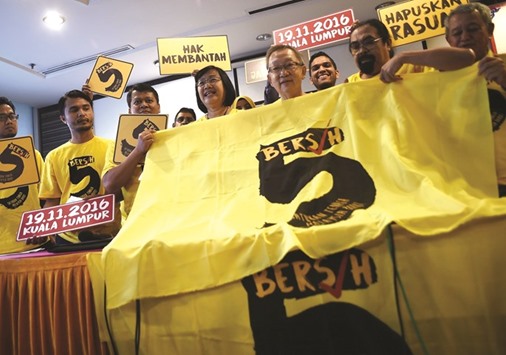“We cannot have a prime minister who steals money from the people and still allow him to be our prime minister,” Maria Chin Abdullah, head of the electoral reforms group Bersih, told reporters in Kuala Lumpur.
Bersih, which was at the forefront of earlier protest rallies, has announced a series of mass actions starting next month to call for electoral reforms and to demand Najib’s resignation.
“Malaysians must stand united and take a strong stand against this grand corruption and the failure of our institutions,” the group said in a statement. “Malaysians must demand reforms.”
Najib’s woes started in July 2015 when a report by the Wall Street Journal suggested that $673mn in the prime minister’s personal bank accounts had been siphoned off from the beleaguered state fund 1Malaysia Development Berhad (1MDB).
1MDB was established in 2009 after Najib became prime minister with the goal of boosting local industries, but it has since been hobbled by an estimated $12bn to $14bn in debt and allegations of government mismanagement.
Najib has denied accusations that the money in his personal accounts came from 1MDB.
Subsequent investigations by Malaysia’s Attorney General’s Office determined that the funds comprised political donations from the Saudi royal family.
Critics questioned those findings despite Saudi Arabia’s foreign minister saying that the money in Najib’s accounts indeed came from the Saudi royal family as donations.
Further suspicions about the funds were raised in July when the US Justice Department filed forfeiture cases against assets related to several individuals, including Najib’s stepson, who is suspected of stealing money from state funds and laundering it in the US.
Former deputy prime minister Muhyiddin Yassin has warned that the country is becoming a failed state, with the present government unable to address the basic needs of its people.
“Cost of living keeps rising, daily necessities are expensive. The ringgit’s value is low. The people’s income is impacted by a gloomy economy,” he recently said in a statement.
“The country’s economy is poorly managed, corruption is rampant, severe leakages and wastage in government spending makes it difficult to distribute the government’s limited resources to sectors important to the people such as education, healthcare, public transformation, rural development, welfare and others,” he added.
Muhyiddin is calling for the formation of a new, credible government to restore the economy, provide job opportunities and improve the living conditions of the people.
But Joseph Chinyong Liow, a former senior fellow in the US-based Centre for East Asia Policy Studies, said that replacing Najib is easier said than done.
“Najib has used the powers of incumbency adroitly to head off any potential challenge and tighten his grip on the party,” he said.
“He has done so by out-manoeuvring pretenders (Najib already removed deputy prime minister Muhyiddin Yassin), sidelining opponents, and co-opting potential dissenters into his cabinet,” he added.
Liow said that even if Najib’s credibility is eroding in the eyes of the Malaysian populace, his position within the United Malays National Organisation (UMNO) does not appear to have weakened, nor does he seem to be buckling under pressure.
“It bears repeating that the arid reality of Malaysian politics is that power still lies within UMNO, so he who controls the party controls Malaysia,” Liow said.
Former prime minister Mahathir Mohamad, who has become an arch-critic of Najib, said ordinary citizens have few options to force Najib to step down because he has such firm control over the government.
“They cannot do anything themselves because Malaysia Official 1 (Najib) controls the Attorney General and the police – the enforcement agencies,” the 90-year-old Mahathir said.
“They cannot remove him through a vote of non-confidence as he controls a majority of the Members of Parliament,” he added.
According to Mahathir, only foreign intervention could lead to a change of government in Malaysia.
Social activist Augustine Loorthusamy, who has participated in anti-government protests for more than a decade, believes the people will eventually unite to topple the government.
“We have seen it in the Philippines, we have seen it in the former Soviet Union and Poland. Eventually the people take charge of their own destiny,” he told DPA.

